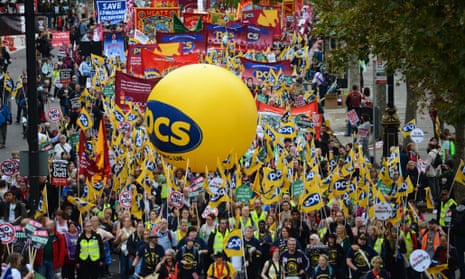The biggest crackdown on trade union rights for 30 years will be unveiled on Wednesday, including new plans to criminalise picketing, permit employers to hire strike-breaking agency staff and choke off the flow of union funds to the Labour party.
The scale of the reforms goes far wider than the previously trailed plan for strikes to be made unlawful unless 50% of those being asked to strike vote in the ballot.
In a set of proposals on a par with those introduced by Norman Tebbit in 1985, Sajid Javid, the business secretary, is also to require that at least 40% of those asked to vote support the strike in most key public services. In the case of 100 teachers asked to strike, the action would only be lawful if at least 50 teachers voted and 40 of them backed the strike.
The double threshold would have to be met in any strike called in health, education, fire, transport, border security and energy sectors – including the Border Force and nuclear decommissioning.
In further changes, Javid will:
Require all unions, not just those affiliated to Labour, to ask each existing union member whether they wish to pay the political levy and then repeat the question every five years. The £25m annual political fund income from 4.5 million political levy payers funds a wide range of political campaigning including being a chief source of funding for Labour.
Propose that unlawful or intimidatory picketing should become a criminal as opposed to civil offence and new protections should be available for those workers unwilling to strike. A named official will be required to be available at all times to the police to oversee the picket including the numbers on the line, currently set at six, in an existing code of conduct.
Compel unions to renew any strike mandate with a fresh ballot within four months of the first ballot and give employers the right to hire strike-breaking agency staff as well as require a union to give the employer at least a fortnight’s notice before the industrial action starts.
Empower the government to set a limit on the proportion of working time any public sector worker can spend on trade union duties.
Give the government certification officer powers to fine trade unions as much as £20,000 for breaches of reporting rules including an annual audit on its protests and pickets. The certification officer will also have power to initiate investigations and will in future be funded by a joint levy of unions and employers
Require a clear description of the trade dispute and the planned industrial action on the ballot paper, so that all union members are clear what they are voting for.
The number of working days lost due to strikes was 704,000 in the 12 months to April 2015, but this is a far cry from the near 13m days lost through strike action on average in the 70s, the heyday of union militancy.
The government says it feels forced to act due to the number of strikes called on the London underground, railways or in schools based on small turnouts or two-year-old ballot mandates.
The leader of the train drivers’ union Aslef, Mick Whelan, has already likened the attack on union rights as resonant of fascist Germany.
Paul Kenny, the GMB general secretary, warned the reforms would poison industrial relations in the UK since they removed all incentives for employers to heed their own workers and settle disputes. He said: “When workers jump through draconian hurdles for their vote for strike action to be lawful, the employers can then ignore the will of their own workers. Workers will have to give employers 14 days’ notice of strike action. That is more than enough time for employers to legally hire another workforce to break the strike.”
The changes to the current system of contracting out of paying the political levy are also likely to be equally controversial since there had been an unwritten understanding at Westminster that no party would introduce partisan reforms to party funding without cross party consensus.
Repeated attempts, notably by the former Liberal Democrat leader Nick Clegg, to reach cross party consensus on funding reform foundered when the Conservatives refused to accept a new lower individual donation cap and Labour resisted major changes to the political levy.
The Javid plans, which were not clearly set out in the Conservative manifesto, are likely to blow a hole in Labour party funding because the number of union members who will proactively support paying the political levy will be much lower than those who pay the political levy through inertia.
Kenny said: “It is clear the Tory party high command intend to make the Labour party bankrupt by cutting off the main source of funding that they have relied on since the 1930s. This is aimed at undermining political campaigning by unions on behalf of their members and communities.”
He said the proposals were one sided since there were no parallel proposals to insert more democratic requirements on company donations to parties.
Javid said: “Trade unions have a constructive role to play in representing their members’ interests but our one-nation government will balance their rights with those of working people and business.
“These changes are being introduced so that strikes only happen when a clear majority of those entitled to vote have done so and all other possibilities have been explored.
“This will deliver a key commitment we made in our manifesto.”
The employment minister, Nick Boles, said: “People have the right to expect that services on which they and their families rely are not going to be disrupted at short notice by strikes that have the support of only a small proportion of union members.
“These are sensible and fair reforms that balance the right to strike with the right of millions of people to go about their daily lives without last minute disruption.”

Comments (…)
Sign in or create your Guardian account to join the discussion